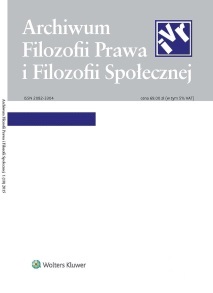Emotional Labour of Judges
Emotional Labour of Judges
Author(s): Maciej Wojciechowski, Bogna Dowgiałło , Dorota Rancew-SikoraSubject(s): Law, Constitution, Jurisprudence, Philosophy of Law, Philosophy of Law
Published by: Stowarzyszenie Filozofii Prawa i Filozofii Społecznej – Sekcja Polska IVR
Keywords: Arlie Hochschild; legal culture; judicial impartiality
Summary/Abstract: Our article concentrates on emotions as related to the functioning of man in the judicial system seen as a modern bureaucratic institution. Special attention is given to the work of judges due to their key position in this system. In legal discourse there is a dominating normative idea of a judge as a decision-making subject free of any emotional factors influencing their judgment. According to this traditional approach, a decision biased even in the slightest way by emotions could not be regarded as impartial, whereas judicial impartiality is regarded as one of the core values of the justice system. Our standpoint assumes not only that judges experience emotions but also asserts that they are being manifested in varied ways. Our analysis is based on Arlie Hochschild’s conception of emotional labour. Such labour is being performed when an individual reflects on his or her feelings and makes an effort either to change or to inhibit emotions which are regarded as misfitting. The necessity of emotional work is a result of cultural feeling and expression rules. It seems prima facie that there is one clear expression rule regarding displaying emotions by the judge in the Polish legal culture: no emotions allowed. However, contrary to possible reconstructed declarations and recommendations warning judges against showing emotions, the rules of expressing them in Polish courts are not unequivocal. We claim that one can distinguish between unconditional and conditional rules of expressing emotions. The former relate to expressing emotions concerning non-professional participants, and conditional rules of expressing emotions relate to professional participants in the hearing. There are situations in which an emotional reaction is reasonable, because it represents certain values to which the justice department adheres, and those in which judges regret showing annoyance or anger. The goal of the emotional labour performed is not only a realization of the value of impartiality, but also the balance of the judges that allows them to efficiently fulfil their role.
Journal: Archiwum Filozofii Prawa i Filozofii Społecznej
- Issue Year: 10/2015
- Issue No: 1
- Page Range: 97-109
- Page Count: 13
- Language: English

